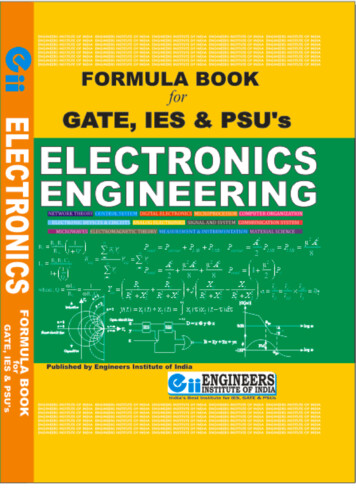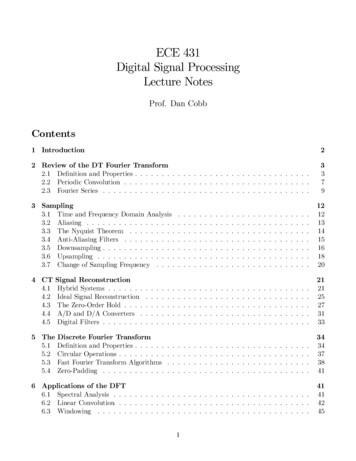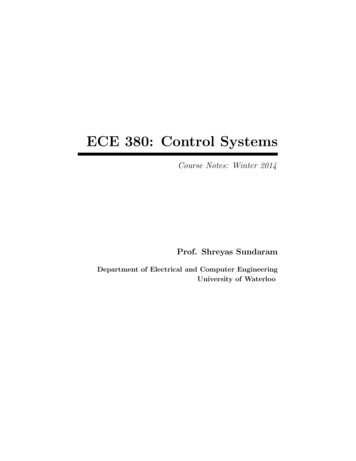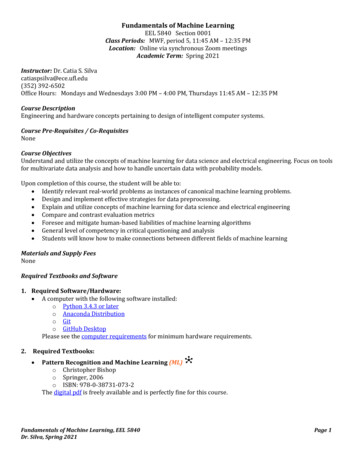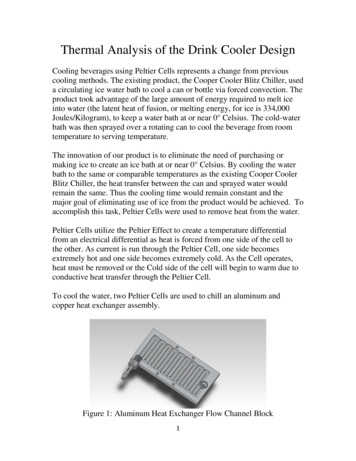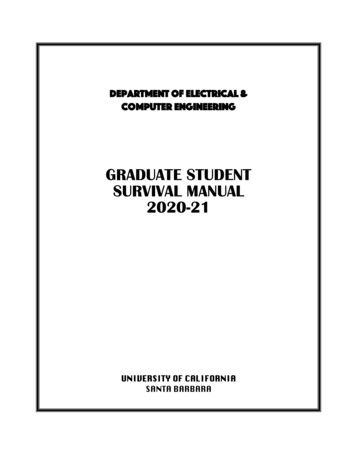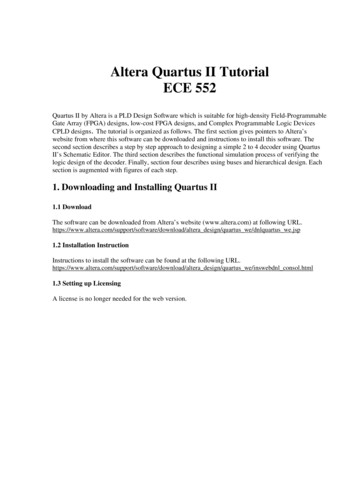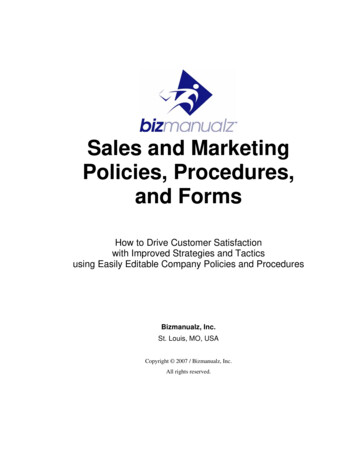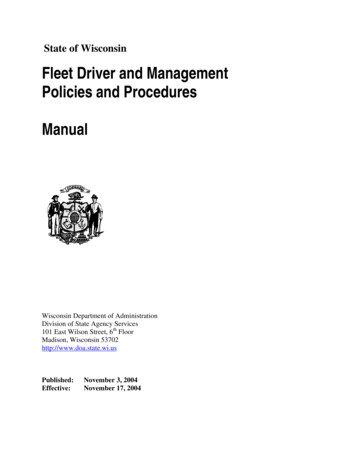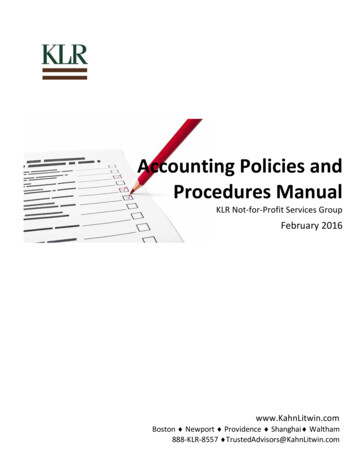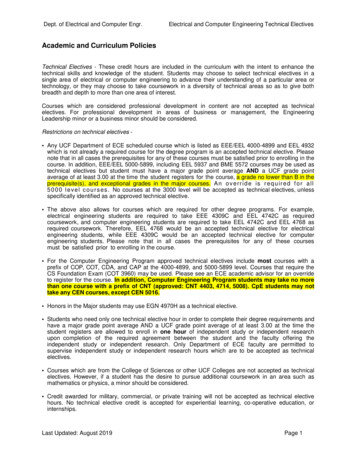
Transcription
Dept. of Electrical and Computer Engr.Electrical and Computer Engineering Technical ElectivesAcademic and Curriculum PoliciesTechnical Electives - These credit hours are included in the curriculum with the intent to enhance thetechnical skills and knowledge of the student. Students may choose to select technical electives in asingle area of electrical or computer engineering to advance their understanding of a particular area ortechnology, or they may choose to take coursework in a diversity of technical areas so as to give bothbreadth and depth to more than one area of interest.Courses which are considered professional development in content are not accepted as technicalelectives. For professional development in areas of business or management, the EngineeringLeadership minor or a business minor should be considered.Restrictions on technical electives Any UCF Department of ECE scheduled course which is listed as EEE/EEL 4000-4899 and EEL 4932which is not already a required course for the degree program is an accepted technical elective. Pleasenote that in all cases the prerequisites for any of these courses must be satisfied prior to enrolling in thecourse. In addition, EEE/EEL 5000-5899, including EEL 5937 and BME 5572 courses may be used astechnical electives but student must have a major grade point average AND a UCF grade pointaverage of at least 3.00 at the time the student registers for the course, a grade no lower than B in theprerequisite(s), and exceptional grades in the major courses. A n o v e r r i d e i s r e q u i r e d f o r a l l5 0 0 0 l e v e l c o u r s e s . No courses at the 3000 level will be accepted as technical electives, unlessspecifically identified as an approved technical elective. The above also allows for courses which are required for other degree programs. For example,electrical engineering students are required to take EEE 4309C and EEL 4742C as requiredcoursework, and computer engineering students are required to take EEL 4742C and EEL 4768 asrequired coursework. Therefore, EEL 4768 would be an accepted technical elective for electricalengineering students, while EEE 4309C would be an accepted technical elective for computerengineering students. Please note that in all cases the prerequisites for any of these coursesmust be satisfied prior to enrolling in the course. For the Computer Engineering Program approved technical electives include most courses with aprefix of COP, COT, CDA, and CAP at the 4000-4899, and 5000-5899 level. Courses that require theCS Foundation Exam (COT 3960) may be used. Please see an ECE academic advisor for an overrideto register for the course. In addition, Computer Engineering Program students may take no morethan one course with a prefix of CNT (approved: CNT 4403, 4714, 5008). CpE students may nottake any CEN courses, except CEN 5016. Honors in the Major students may use EGN 4970H as a technical elective. Students who need only one technical elective hour in order to complete their degree requirements andhave a major grade point average AND a UCF grade point average of at least 3.00 at the time thestudent registers are allowed to enroll in one hour of independent study or independent researchupon completion of the required agreement between the student and the faculty offering theindependent study or independent research. Only Department of ECE faculty are permitted tosupervise independent study or independent research hours which are to be accepted as technicalelectives. Courses which are from the College of Sciences or other UCF Colleges are not accepted as technicalelectives. However, if a student has the desire to pursue additional coursework in an area such asmathematics or physics, a minor should be considered. Credit awarded for military, commercial, or private training will not be accepted as technical electivehours. No technical elective credit is accepted for experiential learning, co-operative education, orinternships.Last Updated: August 2019Page 1of10 9
Dept. of Electrical and Computer Engr.EE1: Power and Renewable Energy TrackEE3: RF and Microwaves TrackProgramElectrical and Computer Engineering Technical ElectivesEE2: Communications and Signal Processing TrackCpE1: Digital VLSI Circuits TrackCourseEE, CpEBME 5572 ECS-EECS 3(3,0) Biomedical Nanotechnology: PR: EEL 3123C with a “C” (2.0) or better grade.Human Physiology, Bioelectric Phenomena and Neurons, Nanoelectronics for fabrication of biochips for humanbiomedical applications, self-assembly, bioelectronics, moral and ethical issues. Spring.EE, CpEEGN 4060C ECS-ECS 3(2,3) Introduction to Robotics: PR: COP 3223C or EGN 3211; and EEL 3657orEEL 4742C or COP 3503C or EGN 3321. Theory and application of robotics topics including; architecture,path planning, sensing and manipulation. SpringEE1EE2CpEEEE 4309C ECS-EECS 4(3,3) Electronics II: PR: EEE 3307C, EEE 3342C with a grade of “C” (2.0) or better.Ideal Op-Amps and applications. Introduction to Logic Circuits; Bipolar, MOS and CMOS families; Flip-flops andmemory cells, comparators and timing circuits: A/D and D/A converters. Fall,Spring. M&S fee 20.00EEEEE 4314 ECS-EECS 3(3,0) Device Electronics for Integrated Circuits: PR: EEE 3350. P.N. Junctions, BipolarTransistor Analysis, Metal Semiconductor contacts, MOS Systems MOSFET Analysis and Limitations.Occasional.CpEEEE 4334 - Computer-Aided Design of VLSI: PR: Grade of “C” (2.0) or better in both COP 3503C and EEE3342C . Introduction to computer-aided design techniques for high-level synthesis, logic synthesis, and physicalsynthesis. Emphasis on algorithms and data structures. SpringEE, CpEEEE 4346C ECS-EECS 3(2,3) Hardware Security and Trusted Circuit Design: PR: EEL 3801C with a grade of“C” (2.0) or better. Design, analysis and synthesis of sequential logic circuits and systems. Data path andcontroller design using a hardware descriptive language. Case studies on hardware security. Spring.EEEEE 4463 ECS-EECS 3(3,0) MEMS Devices and Applications: PR: EEE 3350 or C.I. Micro-Electro MechanicalSystems devices, microfabrication, sensors and actuators, bulk and surface micromachining, optical MEMS,instrumentation and applications. Fall.EE, CpEEEE 4650 - Introduction to Sensors PR: EEL 3123C. Basics of measurements, physics of energy transduction,sensor specifications (range, sensitivity, accuracy, repeatability, noise), applications, basics of signalconditioning. Even FallEE, CpEEEE 4775 - Real-Time Systems PR: COP 4600 or EEL 4768 or EEL 4742C. Introduction to specification,analysis, design, and validation techniques for real-time (operating) systems with an emphasis on real-timescheduling theory. Odd SpringEEEEE 5265 ECS-EECS 3(3,0) Biomedical Effects and Applications of Electromagnetic Energy: PR: EEL 3470 orC.I. RF and microwave energy and their interaction with biological materials. Specific biomedical effects such asabsorption, thermal therapy, hyperthermia, etc., will be discussed. Even Spring.EEEEE 5272 ECS-EECS 3(3,0) Biomedical Sensors: PR: EEL 4750 or EEL 4832 or C.I. Study of engineeringconcepts behind the various biomedical sensors used to monitor a patient undergoing clinical therapy.Occasional.EEEEE 5279 ECS-ECE 3(3,0) Advanced Bioelectronics Systems: PR: EEE 4309C or C.I. Advancedbioelectronics systems and techniques that enable recent biophysical and biomedical research will bediscussed. Spring.EEEEE 5323 Radio Frequency Integrated Circuit Design: PR: EEE 3307C and EEL 3470This course introduce the principles, analysis, and design of Radio frequency (RF) integrated circuits forwireless communication systems. FallEEEEE 5332C ECS-EECS 3(2,3) Thin Film Technology: PR: EEE 3350 or equivalent. Presents the various thinfilm deposition techniques for the fabrication of microelectronic, semiconductor, and optical devices. Occasional.M&S fee: 70.00EEEEE 5352 ECS-EECS 3(3,0) Semiconductor Material and Device Characterization: PR: EEE 3350 or C.I.Semiconductor material characterization resistivity, mobility, doping carrier lifetime, device properties, thresholdvoltage, interface charge of MOS devices, optical and surface characterization of films. Odd FallLast Updated: August 2019Page 2of10 9
Dept. of Electrical and Computer Engr.ProgramEE, CpEEEEE, CpEElectrical and Computer Engineering Technical ElectivesCourseEEE 5353 ECS-EECS 3(3,0) Semiconductor Device Modeling and Simulation: PR: EEE 3307C. Large signaland small signal model development for semiconductor diodes, BJTs, and MOSFETs. Parameter extraction,numerical algorithm, and SPICE simulation are included. Spring.EEE 5356C ECS-EECS 4(3,3) Fabrication of Solid-State Devices: PR: EEE 3350. Fabrication of microelectronicdevices, processing technology, ion implantation and diffusion, device design, and layout. Laboratory includesdevice processing technology. Fall, Spring. M&S fee: 70.00EEE 5370 ECS-EECS 3(3,0) Operational Amplifiers: PR: EEE 4309C. Ideal and non-ideal Op-Amps. Linearapplications. Active RC and switched-capacitor filters. Non-linear and other functional circuits. Frequencystability and compensation of Op-Amps. Even Fall.EEEEE 5378 ECS-EECS 3(3,0) CMOS Analog and Digital Circuit Design: PR: EEE 4309C. Advanced principlesand design techniques for CMOS ICs including most recent published results. Fall.EE, CpEEEE 5390C ECS-EECS 3(2,3) Full-Custom VLSI Design: PR: EEE 3307C and EEE 3342C with a “C” (2.0) orbetter grade. Provide background in integrated devices, circuits, and digital subsystems needed for design andimplementation of silicon logic chips. Occasional.EE, CpEEEE 5513 ECS-EECS 3(3,0) Digital Signal Processing Applications: PR: EEL 4750. The design and practicalconsideration for implementing Digital Signal Processing Algorithms including Fast Fourier Transformtechniques, and some useful applications. Spring.EEEEE 5542 ECS-EECS 3(3,0) Random Processes I: PR: EEL 3552C and STA 3032. Elements of probabilitytheory, random variables, and stochastic processes. Fall, Spring.EEEEE 5555 ECS-EECS 3(3,0) Surface Acoustic Wave Devices and Systems: PR: EEL 3552C. Course discussesSAW technology which includes the physical phenomenon, transducer design and synthesis, filter design andperformance parameters. Actual devices and communication systems are presented. Occasional.EE, CpECpEEEE 5557 ECS-EECS 3(3,0) Introduction to Radar Systems: PR: EEL 3552C. Introduction to Pulse and CWRadar Systems. Chirp Radar Systems. Tracking Radar. Noise in Radar Systems. Spring.EEE 5790 - Introduction to Secure Architectures: Prerequisite(s): EEL 4768.This course will provide the students with basic understanding of the state-of-the-art support for implementingsecurity primitives in commodity processors. Specifically, the course focus on Intel’s Safe-GuardExtension(SGX), ARM’s TrustZone and AMD’s SME and SEV. Fall, SpringCpEEEL 3552C ECS-EECS 4(3,3) Signal Analysis and Analog Communication: PR: EEL 3123C with a grade of“C” (2.0) or better. Signals and signal space, Signals and signal space, Fourier series, Fourier Integral,transmission over linear systems, AM, FM, PM, sampling theorem and Nyquist rate. Fall, Spring M&S fee 15.00CpEEEL 3657 ECS-EECS 3(3,0) Linear Control Systems: PR: EEL 3123C with a grade of “C” (2.0) or better. Controltheory, transfer function modeling, Nyquist criteria, root locus, Bode plots, and Design of lead and lagcompensation. Fall,Spring.EE, CpEEEL 4140C ECS-EECS 4(3,3) Analog Filter Design: PR: EEL 3123C with a grade of “C” (2.0) or better. Passiveand active analog filter design. Fall. M&S fee 15.00EE, CpEEEL 4205 ECS-EECS 3(3,0) Electric Machinery: PR: EEL 3004C with a grade of “C” (2.0) or better.Fundamentals of DC and AC electric machines. Fall.EE, CpEEEL 4216 ECS-EECS 3(3,0) Fundamentals of Electric Power Systems: PR: EEL 3004C with a grade of“C” (2.0) or better. Three-phase power representation and analysis, transformers, per unit system, symmetricalcomponents, faults, and transmission lines. Spring.EEEE, CpEEEL 4294 ECS-ECE 3(3,0) Introduction to Smart Grid: PR: (EEE 3307C and EEL 3657) or EEL 4216 or C.I.Fundamentals of electric power systems, distributed generation and smart grid components, voltage control andVAR compensation, demand response, leader-follower optimization, resiliency. Even Spring.EEL 4362 ECS-ECE 3(3,0) Post-CMOS Devices and Circuits: PR: EEE 3342C with a grade of “C” (2.0) or betterand EEE 3307C. Post-CMOS device technologies for next-generation energy efficient memory and logic designs.Fall.Last Updated: August 2019Page 3of10 9
Dept. of Electrical and Computer Engr.ProgramElectrical and Computer Engineering Technical ElectivesCourseEEEEL 4436C ECS-EECS 4(3,3) Microwave Engineering: PR: EEL 3470. Transmission line theory, Smith charts,S-parameters, simple impedance matching circuits, wave guides, resonators, basic microwave measurements.May be repeated for credit. Fall. M&S fee: 35.00EEEEL 4440C Optical Engineering: PR: EEL 3470 or C.I. Lens systems, aberrations, sources, radiometry,detectors, physical optics, interferometric devices, applications to engineering design problems. FallEE, CpEEEL 4515C ECS-ECE 4(3,3) Fundamentals of Digital Communication: PR: EEL 3552C. Sampling andaliasing, quantization, PCM, delta modulation, line coding, intersymbol interference, Digital carrier systems,ASK, FSK, PSK, M-ary communication, Noise, BER analysis. Spring. M&S fee 20.00EE, CpEEEL 4518 ECS-EECS 3(3,0) Satellite Communications: PR: EEL 3552C. The principles of satellitecommunications, including communications satellites, Earth stations, link analysis, FDMA and TDMA. May berepeated for credit. Fall.EE, CpEEEL 4612C ECS-EECS 4(3,3) Introduction to Modern and Robust Control: PR: EEL 3657. Classical controltheory including differential equations and Laplace transform techniques, stability analysis, and classicalfrequency domain design. Modeling and Position, Speed, Vibration Control Design Laboratories.Occasional.EE, CpEEEL 4635C CECS-EECS 4(3,3) Computer Control Systems: PR: EEL 3657. Discrete-time systems, the ztransform, and single loop computer control systems. Digital simulation in the analysis and design of processeswith embedded computers. No graduate credit for both EEL 5630 and this course. Occasional.EE, CpEEEL 4660 ECS-EECS 3(3,0) Robotic Systems: PR: EGN 3321 or EEL 4742C or COP 3503C. Team baseddevelopment of a robotic system incorporating concepts such as sensing, computer vision, machine learning,localization, mapping, manipulation and locomotion. Fall.CpEEE3EEL 4750 ECS-EECS 3(3,0) Digital Signal Processing Fundamentals: PR: EEL 3123C with a grade of “C” (2.0)or better. Study of discrete-time signals and systems, Z-transform, DFT introduction to digital filter design.Fall,Spring.EEEEL 4768 ECS-EECS 3(3,0) Computer Architecture: PR: EEL 3801C or CDA 3103C with a grade of “C” (2.0) orbetter. Computer systems performance and evaluation, processor datapath and control, microprogrammedarchitectures, instruction and arithmetic pipelines, cache and virtual memory, and RISC vs. CISC. Fall,Spring.EEEEL 4781 ECS-EECS 3(3,0) Computer Communication Networks: PR: EEL 3801C with a grade of “C” (2.0) orbetter and STA 3032. Network models. Media access protocols. Data link control. Routing and flow control.Internetworking. Current architectures and protocols: OSI, ethernet, token, ring, FDDI, HSLC, X.25, etc.Fall,Spring.EE, CpEEE, CpEEEL 4783 ECS-EECS 3(3,0) Hardware Description Languages in Digital Systems Design: PR: EEE 3342C witha grade of “C” (2.0) or better. Hardware description languages, simulation and synthesis of RTL circuits andsystems, design examples and projects. Occasional.EEL 4798 ECE-EECS 3(3,0) Massive Storage and Big Data: PR: EEL 3801C or CDA 3103C . Fundamentalsin big data architecture and its enabling file storage systems Infrastructure such as MapReduce and storage,with a focus on system architecture, file storage, programming models, application development andperformance evaluation. SpringEE, CpEEEL 4817H ECS-EECS 3(3,0) Honors Current Topics in Machine Learning II: PR: Consent of Honors and EEL4818H. Research topics in Machine Learning. Students will be assigned a research project and a faculty mentorwho will supervise this project. Spring.EE, CpEEEL 4832 ECS-EECS 3(3,0) Engineering Applications of Computer Methods: PR: EEL 3123C and EGN 3211both with a grade of “C” (2.0) or better. Engineering applications of numerical methods, including solution ofdifferential equations, simulation, optimization, and multidimensional root-finding, integration and seriesapproximations. Fall,Spring.EE, CpEEEL 4851C ECS-EECS 4(3,3) Engineering Data Structures: PR: EEL 3801C with a grade of “C” (2.0) or better.Design of data structures and algorithms, with emphasis on performance analysis, memory organization, stacks,queues, linked lists, trees, graphs, searches, and sorts. Introduction to object-oriented structures. Occasional.CpEEEL 4872 ECS-EECS 3(3,0) Engineering Applications of Intelligent Systems: PR: EEL 4851C or COP 3503C orequivalent or C.I. Knowledge and intelligence, predicate logic and automated reasoning, heuristic search,knowledge representation, automated planning, introduction to machine learning, knowledge-based systemsand philosophy of AI. Occasional.Last Updated: August 2019Page 4of10 9
Dept. of Electrical and Computer Engr.Electrical and Computer Engineering Technical ElectivesProgramCourseEE, CpEEEL 4882 ECS-EECS 3(3,0) Engineering Systems Software: PR: EEL 3801C. Introduction to operating systemsconcepts and facilities for engineering applications, including multiprogramming, resource allocation andmanagement, systems utilities, and operating system implementation. Fall,Spring.EE, CpEEEL 4884C ECS-EECS 4(3,3) Engineering Software Design: PR: EEL 4851C. Software systems developmentlife cycle, function and object-oriented methodologies, CASE; Analysis, design, and development of a largesoftware project. Fall,Spring.EE, CpEEEL 4890 ECS-EECS 3(3,0) Continuous System Simulation I: PR: MAP 2302. Numerical integration techniquesand discrete time system models for approximating the dynamics of continuous systems. Occasional.EE, CpEEEL 5173 ECS-EECS 3(3,0) Linear Systems Theory: PR: EEL 3657. Models and properties of linear systems,transformation, controllability and observability, control and observer designs, MFD, and realization theory.Spring.EE, CpEEEL 5185 ECS-EECS 3(3,0) System Identification: PR: EEL 3657 or C.I. Dynamic systems, models of timeinvariant linear, time-varying and nonlinear systems, nonparametric frequency and time domain identificationmethods, kernel expansion techniques, parameter estimation methods, experiment design, and applications.Spring.EE, CpEEEL 5245C ECS-EECS 3(2,1) Power Electronics: PR: EEE 4309C. Principles of power electronics, powersemiconductor devices, inverter topologies, switch-mode and resonant dc-to-dc converters, cyclo-converters,applications. Fall.EEEEL 5250 ECS-EECS 3(3,0) Power System Detection and Estimation: PR: EEL 4216 or C.I.This is an advanced course to power engineering, designed to provide students with the knowledge of stabilityand outage detection and state estimation methods. OccasionalEEEEL 5255 Advanced Power Systems Analysis: PR: EEL 4216 or C.I.This is an advanced course in power systems engineering, designed to provide a student with the knowledge ofsteady-state analysis in power system operation. Even SpringEEEEL 5268 - Communications and Networking for Smart Grid: PR: EEL 4515C. Introduction to smart gridcommunication infrastructure, communication technologies in smart grid, communication networking in smart grid,communication for vehicle-to-grid systems, secure communication and networking. OccasionalEEEEL 5272 Biomedical Sensors: Prerequisite(s): EEL 4750 or EEL 4832 or C.I.Study of engineering concepts behind the various biomedical sensors used to monitor a patient undergoingclinical therapy. OccasionalEEEEEEL 5291 ECS-EECS 3(3,0) Distributed Control and Optimization for Smart Grid:
electives. For professional development in areas of business or management, the Engineering Leadership minor or a business minor should be considered. Restrictions on technical electives - Any UCF Department of ECE scheduled
